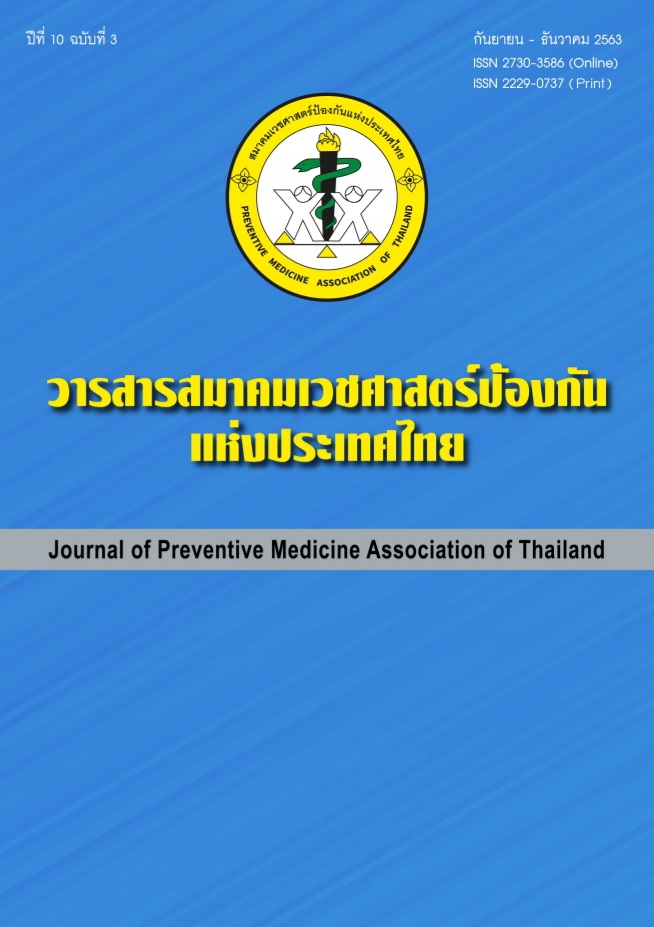Results of Our Treatment Program for Stage 3 Chronic Kidney Disease Patients in CKD Clinic Bang Pa In Hospital
Keywords:
Treatment Program for Stage 3 Chronic Kidney Disease, Kidney Deterioration Treatment, Chronic Kidney DiseaseAbstract
Stage 3 Chronic Kidney Disease Patients are at high risk of complications caused by the dysfunctional organ. Such conditions often lead to premature death, as well as higher expenses for the healthcare provider. This only becomes more troublesome as the disease progresses into its final stage, where the patients require renal replacement therapy. In mitigating these effects, the CKD Clinic plays a crucial role in promoting behavioral changes in patients. To measure the effectiveness of this treatment program, 150 CKD Clinic patients are divided into two groups in a quasi-experimental research, using a simple questionnaire as a selection process. Throughout 12 weeks, one group received the standard treatment, while the other was treated with the new program. Tools used in the program include a guideline for stage 3 chronic kidney disease with a reliability index of 0.97, a set of quizzes on kidney disease with a reliability index of 0.74, and a survey on self-care behaviors to promote kidney health with a reliability index of 0.82. The results are reported in means, percentages, and standard deviation. Meanwhile, the pre- and post-research results are compared with paired samples test statistics and with t-test for independent sample statistics for inter-group comparisons. This research found that the experimental group has a significant increase (p<0.001) in kidney filtration rates, which are also significantly higher than those of the control group. Moreover, the experimental group is significantly (p<0.001) more knowledgeable about chronic kidney disease, significantly more so than the control group as well. Finally, the experimental group scores significantly higher (p<0.001) on assessments of behaviors that prevent kidney deterioration, and also significant higher than the control group. As such, the Treatment Program for Stage 3 Chronic Kidney Disease should be used and implemented for CKD clinics to improve the patients’ quality of life, allow patients to lead a normal life, and prevent the disease from progressing to the final stage.
References
2. World kidney day. Kidney Health for Everyone Everywhere [Internet]. 2019 [cited 2020 Jan 22]. Available from https://www.worldkidneyday.org/2019-campaign/2019-wkd-theme/
3. Hill NR, Fatoba ST, Oke JL, Hirst JA, O’Callaghan CA, Lasserson DS, et al. Global prevalence of chronic kidney disease - a systematic review and meta-analysis. PLOS ONE 2016;11: 1-18.
4. Ingsathit A, Thakkinstian A, Chaiprasert A, Sangthawan P, Gojaseni P, Kiattisunthorn K, et al. Prevalence and risk factors of chronic kidney disease in the Thai adult population:Thai SEEK study. Nephrology Dialysis Transplantation 2010; 25:1567-5.
5. สำนักงานสาธารณสุขจังหวัดพระนครศรีอยุธยา. ฐานข้อมูล HDC สำนักงานสาธารณสุขจังหวัดพระนครศรีอยุธยา [อินเทอร์เน็ต]. 2562 [เข้าถึงเมื่อ 18 ม.ค.2563]. เข้าถึงได้จาก: http://www.ayo.moph.go.th/main/index.php
6. โรงพยาบาลบางปะอิน คลินิกชะลอไตเสื่อม (CKD). รายงานสถิติผู้ป่วยที่มารับการรักษาที่คลินิกชะลอไตเสื่อม (CKD) โรงพยาบาลบางปะอิน ปี พ.ศ. 2559-2561. พระนครศรีอยุธยา: โรงพยาบาลบางปะอิน; 2562.
7. กลุ่มโรคไม่ติดต่อเรื้อรัง สำนักโรคไม่ติดต่อ กรมควบคุมโรค กระทรวงสาธารณสุข. คู่มือปฏิบัติการเพื่อดำเนินงานลดโรคไตเรื้อรัง (CKD) ในผู้ป่วยเบาหวานและความดันโลหิตสูง. พิมพ์ครั้งที่ 1. กรุงเทพฯ:สำนักงานกิจการโรงพิมพ์ องค์กรสงเคราะห์ทหารผ่านศึก ในพระบรมราชูปถัมภ์, 2559.
8. Fisher WA, Fisher JD, Harman, J. The information-motivation-behavioral skills model: A general social psychological approach to understanding and promoting health behavior. Malden: Blackwell; 2003. p.82-106.
9. บุญชม ศรีสะอาด. หลักการวิจัยเบื้องต้น. พิมพ์ครั้งที่ 3. กรุงเทพฯ:สุวีริยาสาสน์; 2535.
10. Gavgani RM, Poursharifi H, Aliasgrazadeh A. Effectiveness of information-motivation-bihavioral skills (IMB) Model in improving self-care behaviors & HBA1C measure in adults with type2 diabetes in Iran-Tabriz. Procedia-Social and Behavioral Sciences 2010;5:1868-73.
11. กิตฑาพร ลือลาภ. ผลของโปรแกรมการให้ข้อมูลการสร้างแรงจูงใจและการพัฒนาทักษะต่อความรุนแรงของโรคข้อเข่าเสื่อมและน้ำหนักตัวในผู้สูงอายุโรคข้อเข่าเสื่อมที่มีน้ำหนักเกิน. [วิทยานิพนธ์ปริญญาพยาบาลศาสตรมหาบัณฑิต]. กรุงเทพฯ:จุฬาลงกรณ์มหาวิทยาลัย; 2559.
12. Osborn CY, Mamico KR, Cruz Noemi, O’Connell AA, Perez-Escamilla R, Kalichman SC, et al. A brief culturally tailored intervention for Puerto Ricans with type2 diabetes. Health Educ Behav 2010;37(6):849-62.
13. Zarani F, Besharat MA, Sarami G, Sadeghian S. An information-motivation-behavioral skill (IMB) model-based intervention for CABG patients. Int J Behav Med 2012;19:543-9. doi:10.1007/s12529-011-9193-2
14. ศิริลักษณ์ ถุงทอง. ผลของโปรแกรมสนับสนุนการจัดการตนเองเพื่อชะลอไตเสื่อมจากเบาหวานต่อการจัดการตนเองและผลลัพธ์ทางคลินิกในผู้ป่วยเบาหวานชนิดที่ 2 ที่ไม่สามารถควบคุมระดับน้ำตาลในเลือดได้. [วิทยานิพนธ์ปริญญาพยาบาลศาสตรมหาบัณฑิต]. สงขลา:มหาวิทยาลัยสงขลานครินทร์; 2556.
15. ปริยากร วังศรี. ผลของโปรแกรมการส่งเสริมการรับรู้สมรรถนะแห่งตนและพฤติกรรมในการควบคุมภาวะไตเสื่อมในผู้ป่วยเบาหวานชนิดที่ 2. [วิทยานิพนธ์ปริญญาพยาบาลศาสตรมหาบัณฑิต]. นครปฐม:มหาวิทยาลัยคริสเตียน; 2559.
Downloads
Published
How to Cite
Issue
Section
License
บทความที่ลงพิมพ์ในวารสารเวชศาสตร์ป้องกันแห่งประเทศไทย ถือเป็นผลงานวิชาการ งานวิจัย วิเคราะห์ วิจารณ์ เป็นความเห็นส่วนตัวของผู้นิพนธ์ กองบรรณาธิการไม่จำเป็นต้องเห็นด้วยเสมอไปและผู้นิพนธ์จะต้องรับผิดชอบต่อบทความของตนเอง






